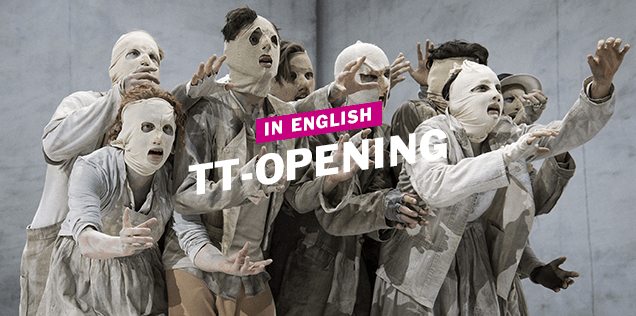The 51st Theatertreffen, “interesting as never before” (!), as announced by Berliner Festspiele’s Artistic Director Thomas Oberender, opened with a prestigious constellation: Dimiter Gotscheff’s monumental staging of Heiner Müller’s text „Cement“.
Two dead icons (the great director Gotscheff died last autumn a few months after the premiere of this very last piece) introduced by a living one: Alexander Kluge. Before the theatre began three of Kluge’s short films were shown, starring Gotscheff reading and Müller talking – or rather Müller smoking, sitting still and listening to Kluge speaking, asking questions and answering to himself. The audience’s reaction to this awkward filmed conversation – tender laughter – showed how affectionate the attachment for the three men is here.
In his following speech Kluge commented on the role of the theatre: allowing a dialogue with the dead, the theatre can picture the complexity of the present time better than any row of information. That’s why he “would have been glad to have those two, Gotscheff and Müller, among us” that night, as he concluded before the show began. Emotional applause.
„Cement”, by Heiner Müller
Director: Dimiter Gotscheff
Premiere: 5. Mai 2013, Residenztheater Munich
– a short review initially published within a collective contribution –
A crowd of people in rags staring at us in a complete silence, followed by the violence of a big block of cement falling on the floor: Gotscheff’s take on Müller’s „Cement“ began with a strong image of Soviet Russia in the 1920s. Interspersed with elements of antique mythologies, it is the story of Gleb Shumalov, a man coming back in his hometown after three years of civil war.
What he finds back home is a tragic self-destructive communist world, where everyone is a potential enemy to kill, where even his wife Dasha has become cold and distant. The extraordinary actress Bibiana Beglau provides her character with the most subtle variation of voices, from almost inhuman to tender or resolute, as she discloses her past thus reflecting on women’s emancipation. The whole piece’s tension is made of this fine balance between disturbing silence and strong sounds, be it actress Valery Tscheplanowa’s deep singing or the sound of a cement block being violently laid down by the main character.
After a fascinating beginning, the piece loses itself in never-ending discussions and speeches until it becomes, unfortunately, really unbearable – which could after all be seen as a way to experience the structural heaviness of this damned world.
Exberliner is partner of the Theatertreffen-blog
Photo: Armin Smailovic
